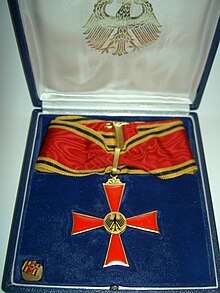Paul Franken (historian)
Paul Franken (born December 19, 1903 in Mönchengladbach ; † December 15, 1984 in Bonn ) was a historian and first director of the Federal Agency for Civic Education in Bonn.
Education
After graduating from high school in 1923, Franken first studied theology and later history in Bonn. In the summer semester of 1924 he joined the K.St.V. Arminia Bonn . With his federal brothers and later well-known historians Theodor Schieffer and Paul Egon Hübinger , he had an intense friendship since his time as Armine. In the winter semester of 1924/25, Franken was elected consenior and in the summer semester of 1925 a senior. In the summer semester of 1926, Franken studied in Berlin, where he received the K.St.V. Semnonia joined. A semester later he returned to Bonn. Franconia finished his studies here on December 17, 1932 with a doctorate from the historian Aloys Schulte . Franconia did not complete the habilitation he was aiming for at times .
Working in KV
In 1931, Franken became chairman of the religious and ideological committee of the Cartel Association of Catholic German Student Associations (KV). In 1930 he had taken over the role of association manager of the KV from Johannes Henry . He led the association, later renamed the Catholic Burschenschaftliche Vereinigung , until it was broken up by the National Socialist rulers in 1936. He then took over the chairmanship of the old gentlemen's association of Arminia in Bonn, until this was also dissolved in 1938.
After the Second World War, Franconia played a key role in building the KV and its Bonn Arminia. From 1951 to 1957 and again from 1961 to 1965, Franconia was chairman of the KV Council and the old gentlemen's association of KV.
time of the nationalsocialism
Franken, who as a member of the Center Party still elected the Center in November 1932, gave his vote in the 1933 Reichstag election for the BVP and shortly afterwards joined the NSDAP . Since 1935, Franconia was in closer contact with his brother Konrad Adenauer . Franconia repeatedly tried to bring Adenauer together with Rhenish resistance circles, which Adenauer always refused and called "stupidity". From November 1937 until January 25, 1939 francs was for the crime against the " treachery law " in Düsseldorf Gestapo -Gefängnis in " protective custody ". Franconia was also released from prison on the intervention of his federal brother Martin Spahn . Franconia began studying to be a teacher in Bonn. But he was refused admission to the exam.
In 1939 Franken left the National Socialist People's Welfare (NSV), and in 1940 he was expelled from the NSDAP. It was not until the spring of 1944 that he rejoined a Nazi organization when he joined the German Labor Front (DAF).
At the end of 1942, through the mediation of Bernhard Letterhaus, he came to the Wehrwirtschaftsstelle of the Wehrmacht in Cologne, whose high command signed him to Rome on January 1, 1943 for the " Abwehr Canaris ". To camouflage his defensive activity, he received a grant from the German Research Foundation (DFG) to participate in the edition of Nunciature reports at the German Historical Institute in Rome (DHI) . In fact, however, he acted as a liaison between resistance groups and the Vatican . His activities in Rome are largely unclear; but he worked with Josef Müller ("Ochsensepp"), who later became the Bavarian Minister of Justice , who in turn also worked with Pope Pius XII through the Jesuit father Robert Leiber . was in contact.
Political activity after the Second World War
After the Second World War , Franconia was denazified on June 18, 1947 and classified as “politically persecuted”. He worked as a private teacher and in the CDU in Bonn. In 1949 he was a lecturer and in 1950 director at the Catholic University of Vechta . From 1952 to 1968 he headed the “Federal Center for Homeland Service”, which later became the Federal Center for Political Education . It also published the weekly newspaper “ Das Parlament ”, which enriched Franconia with the initially controversial supplement “ From Politics and Contemporary History ”. For his services, Franconia was awarded the Great Federal Cross of Merit in December 1968 .
literature
- Ulrich Cartarius : Opposition to Hitler. A narrative illustrated book. Berlin 1984, pp. 201f.
- Michael F. Feldkamp : Paul Franken (1903-1984). Director of the Federal Agency for Political Education. In: Günter letter , Brigitte Kaff, Hans-Otto Kleinmann (ed.): Christian democrats against Hitler. From persecution and resistance to the Union. Edited on behalf of the Konrad-Adenauer-Stiftung eV (= Herder Taschenbuch), Freiburg im Breisgau et al. 2004, pp. 172–178.
- Michael F. Feldkamp: Paul Franken (1903-1984), founding director of the Federal Agency for Civic Education. In: Portal Rhenish History. Edited by the Rhineland Regional Association [1] .
- Hans Peter Mensing (arrangement): Adenauer in the Third Reich. Schöningh, Paderborn 1991, ISBN 3-88680-415-1 (series: Adenauer Rhöndorfer edition).
- Hans-Peter Schwarz : Adenauer. The rise 1876–1952. Deutsche-Verlags-Anstalt, Stuttgart 1986, ISBN 3-421-06323-0 .
Individual evidence
- ^ History of the Federal Agency for Civic Education: Change and Reorganization 1969-1981 . Retrieved July 21, 2011.
| personal data | |
|---|---|
| SURNAME | Franconia, Paul |
| BRIEF DESCRIPTION | German historian and first director of the Federal Agency for Civic Education in Bonn |
| DATE OF BIRTH | December 19, 1903 |
| PLACE OF BIRTH | Mönchengladbach |
| DATE OF DEATH | 15th December 1984 |
| Place of death | Bonn |
